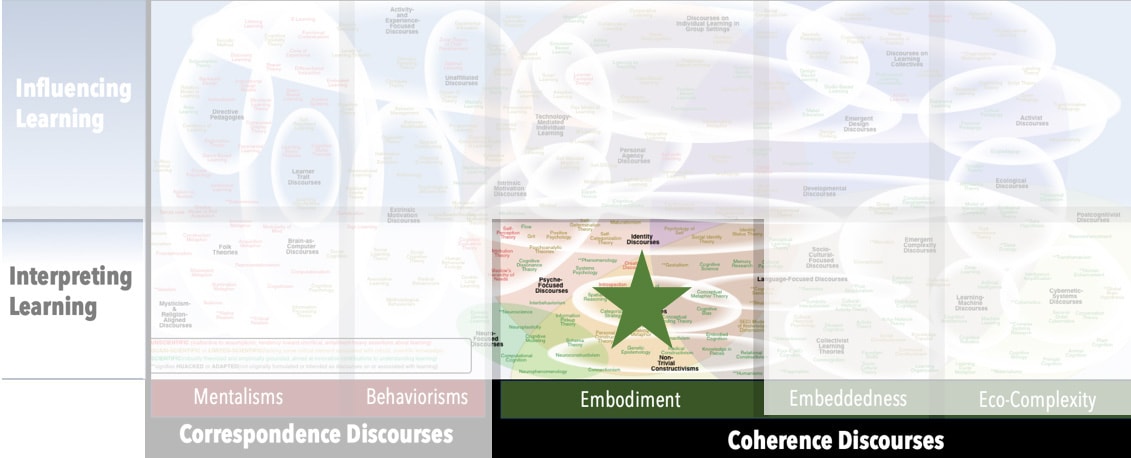AKA
Connectionist Model
Focus
Using artificial neural networks to explain/model mental phenomenaPrincipal Metaphors
- Knowledge is … all possible (coherent) activity on a network
- Knowing is … activation of an appropriate cluster of units in a neural network
- Learner is … a neural network
- Learning is … modifying the strength of connections between units in a neural network
- Teaching is … N/A
Originated
1980sSynopsis
Connectionism (of Cognitive Science) (which should not be confused with Connectionism (of Behaviorisms)) asserts that mental phenomena can be modeled and explained using artificial neural networks that are interconnected in ways that mimic the brain’s nested and distributed structure. The theory builds on the realization that cognition is not a global process that emerges in the collective activity of neurons, but a process that is embodied at each level of the brain’s nested structure (some relevant levels include neurons, minicolumns, macrocolumns, cortical areas, and hemispheres). Connectionism (of Cognitive Science) might thus be included among Eco-Complexity Discourses, with a focus on the level of the brain. Associated discourses include:-
Network-Memory Model (Neural Network Model of Information Retrieval) (various, 1980s) – a conception of Long-Term Memory based on the structure of a decentralized network. The strengths of individual memories and of associations among memories are posited to be affected by recency, repetition, and proximity.
- Spreading Activation (Allan Collins & Elizabeth Loftus, 1970s) – a hypothetical process by which the activation of one part of the brain’s nested structure (e.g., a neuron, a minicolumn, a macrocolumn, etc.) will increase the likelihood that connected structures will activate, and so on, thus spreading through a tightly connected region of the brain
Commentary
In some ways, Connectionism (of Cognitive Science) might be seen as a response to the decline of Cognitivism and Computationalism. As neuroscientists developed better understandings of the brain’s organization, it became obvious that Cognitivism and Computationalism were simply wrong in their assumption that the brain was like a digital computer. By shifting from “computer” to “neural networks,” Connectionism (of Cognitive Science) has revised and revived the hope of creating a digital model of the brain – but, in the process, may be renewing Correspondence Discourses’ reductionist assumption that the cognition is equivalent to brain function. The theory should thus be considered in relation to others with more expansive appreciations of cognition.Authors and/or Prominent Influences
Seymour Papert; Marvin MinskyStatus as a Theory of Learning
Connectionism (of Cognitive Science) is a theory of learning.Status as a Theory of Teaching
Connectionism (of Cognitive Science) does not purport to be a theory of teaching, and it offers few insights that are of immediate relevance at the level of interpersonal engagement that teaching happens.Status as a Scientific Theory
Connectionism (of Cognitive Science) meets our criteria for a scientific theory. Notably, it has strong alignments with several principles of contemporary Cognitive Science, particularly those that (as noted above) acknowledge the nested organization of the brain.Subdiscourses:
-
Network-Memory Model (Neural Network Model of Information Retrieval) -
Network-Memory Model – a conception of Long-Term Memory based on the structure of a decentralized network. The strengths of individual memories and of associations among memories are posited to be affected by recency, repetition, and proximity.
-
Spreading Activation -
Spreading Activation – a hypothetical process by which the activation of one part of the brain’s nested structure (e.g., a neuron, a minicolumn, a macrocolumn, etc.) will increase the likelihood that connected structures will activate, and so on, thus spreading through a tightly connected part of the network
Map Location

Please cite this article as:
Davis, B., & Francis, K. (2023). “Connectionism (of Cognitive Science)” in Discourses on Learning in Education. https://learningdiscourses.com.
⇦ Back to Map
⇦ Back to List
